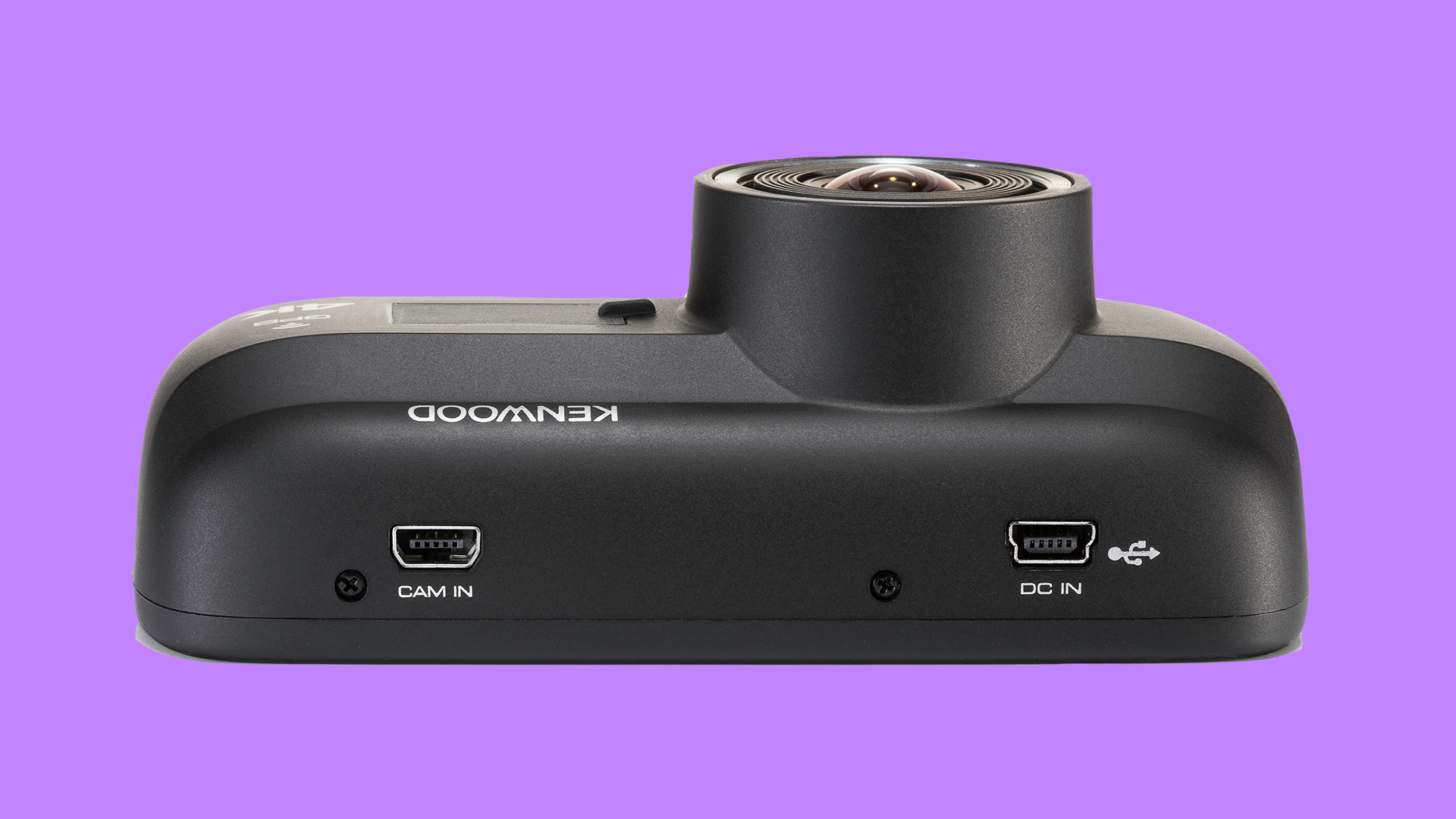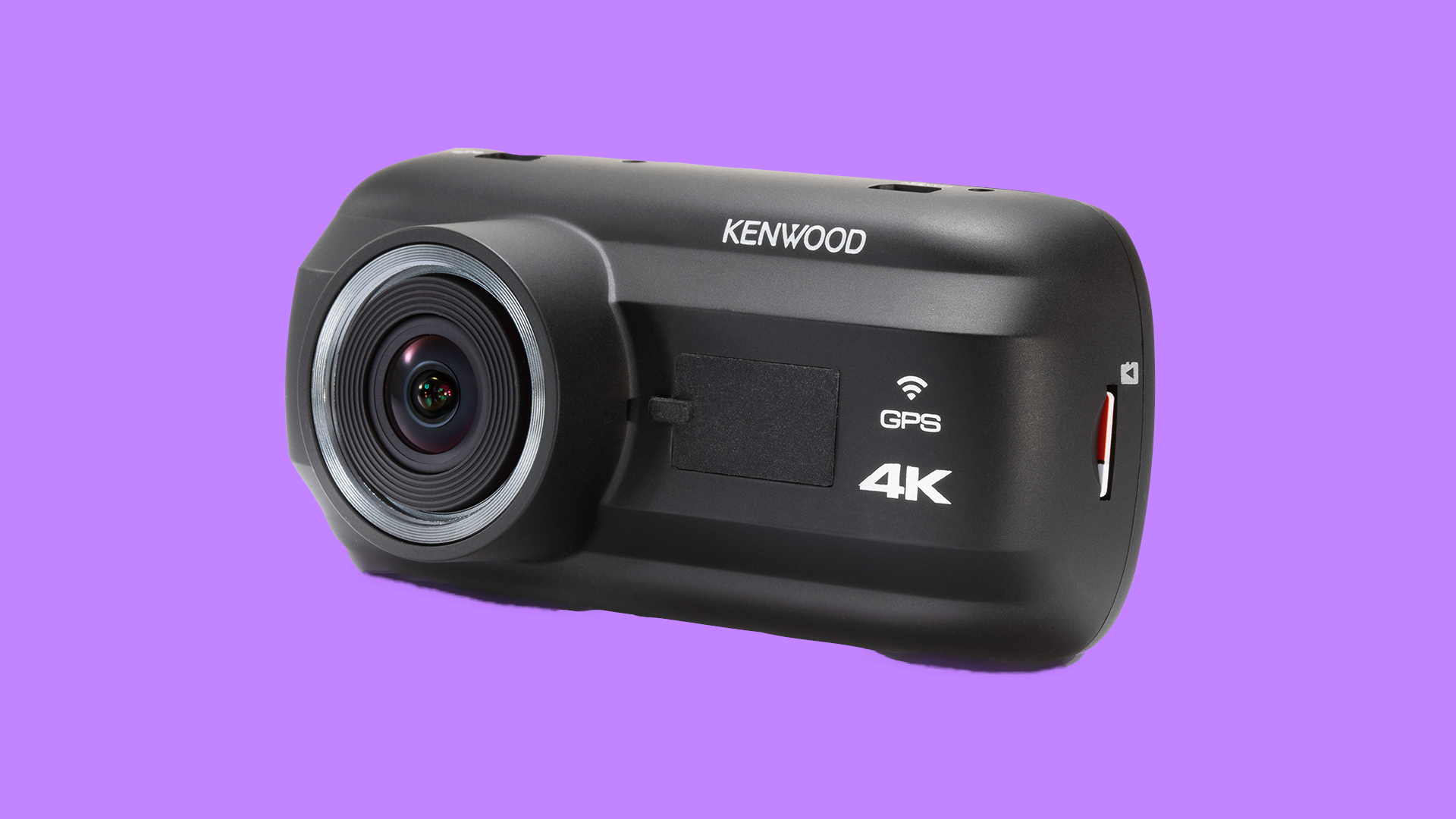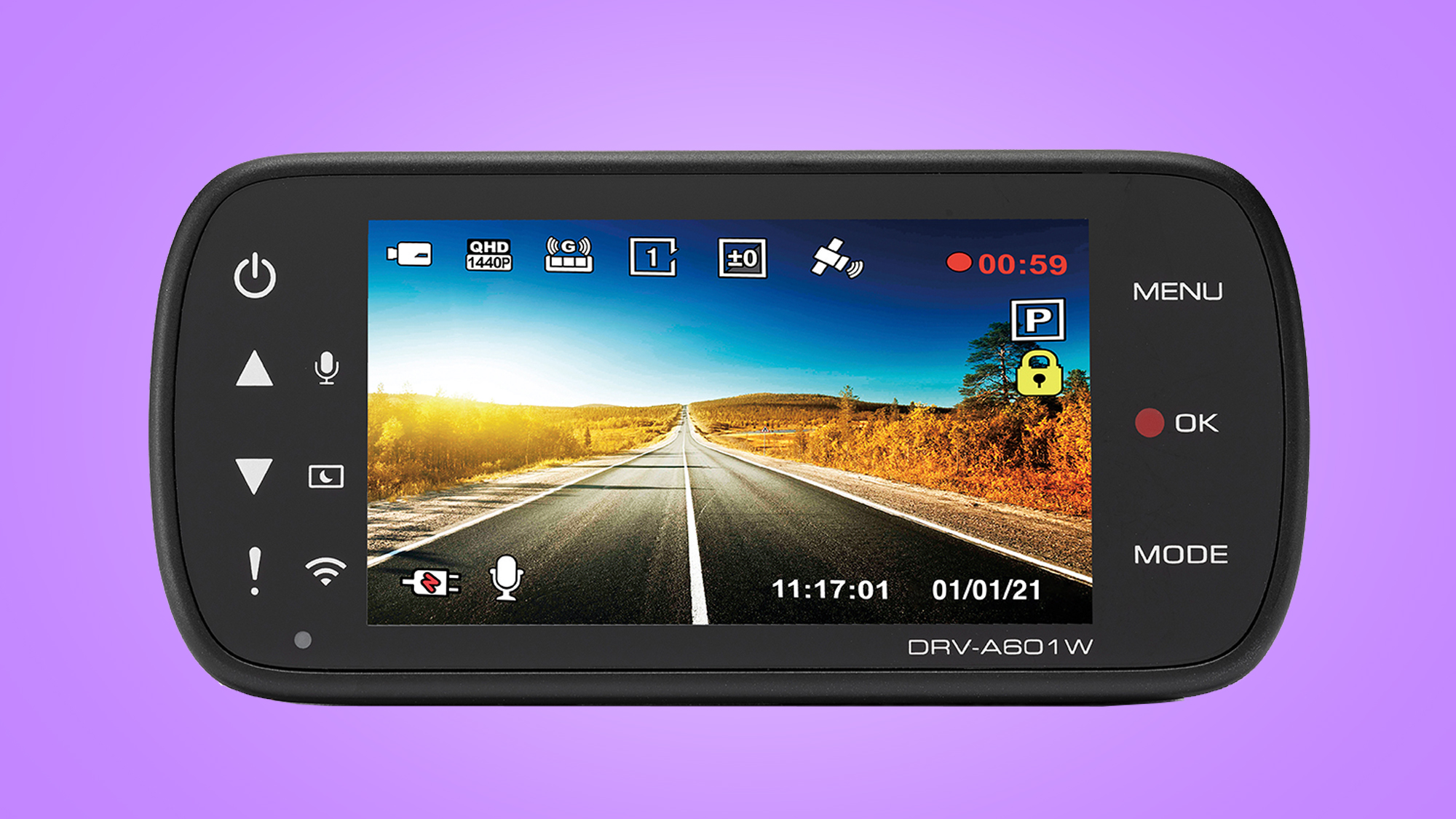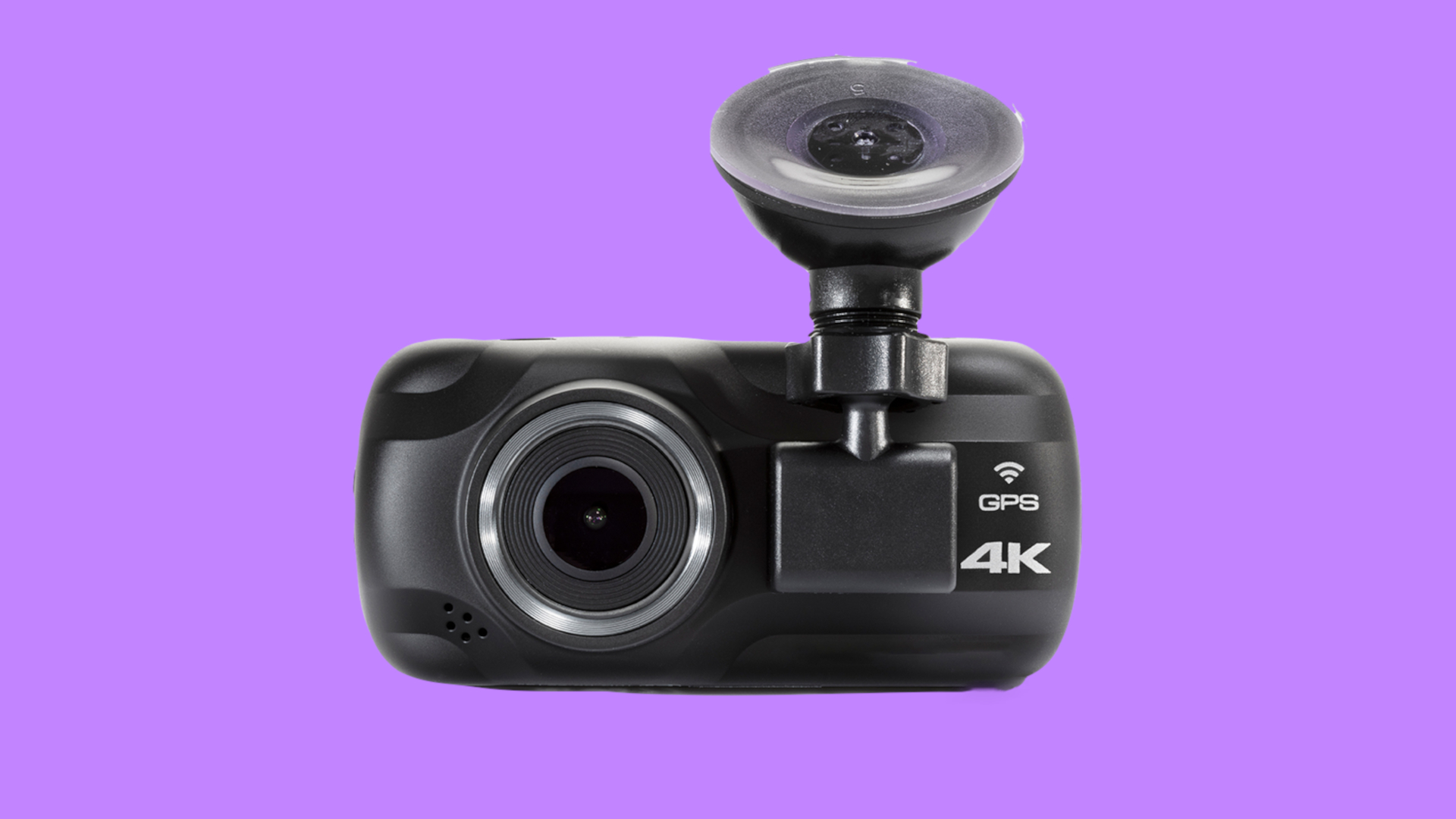Kenwood DRV-A601W
Kenwood might be a name associated with bass-heavy in-car sound systems from the Max Power days of car customization, but it currently offers a solid selection of aftermarket head units – many complete with Apple CarPlay and Android Auto – and a neat line of high-definition dash cams.
The DRV-A601W here is arguably its flagship model, boasting a neat and compact exterior body, 3-inch full-color LCD touchscreen and 3840 x 2160 (8.3M pixels) recording capabilities for capturing crisp footage from the front window.
The Kenwood DRV-A601W is available now in the US, UK and Australia, priced at around $200, £180 and AU$250, respectively.
- These are the best dash cams you can buy in 2021
Although available as a standalone camera, Kenwood is also keen to push its KCA-R200 rear-view camera, which tethers easily to this unit, as well as the CA-DR1030 hard-wiring kit. The latter allows owners to tap into the vehicle’s fuse board and gets around the sticky issue of cameras powering down when modern start/stop engine tech kicks in.
Currently priced at $200 / £180 / AU$250, it sits at the higher end of the dash cam price spectrum, with the excellent Nextbase 622GW as a close rival, alongside handy front and rear camera packages from the likes of Viofo.
Setting up the Kenwood DRV-A601W is simple, requiring a quick clip of the main camera body into the GPS-powered sucker-mount connection. This is aided by a magnetic fixing, which makes it easy to clip together – but feels overly aggressive to remove. In fact, when sucker-mounted to a windscreen, it’s hard to get the camera off this magnetic mount without inadvertently pulling the sucker from the glass too.

Power comes in the form of a typical 12V lighter socket adapter, and the provided cable is plenty long enough to stash away into a car headliner (you also receive cable clips) to avoid awkward dangling wires. Handily, Kenwood also includes a much shorter USB cable for data transfer – but there’s no reason you couldn’t use this to power the camera itself, if you have a cleverly placed USB socket somewhere at the top of the dash. Naturally, you also get adhesive pads and an adhesive mount to fix the camera more permanently.
A detachable polarizing filter is included, too, which is particularly useful when driving in sunnier climates or to guard against glare or reflections from low sunlight on the windscreen. It easily clips to the front of the lens and comes in its own plastic carry container, so you can chuck it in the glovebox when it isn’t in use.
As with many modern dash cams, the set-up process is fairly quick and simple, with merely location, date and time required upon startup. The camera automatically selects full 4K resolution for video-recording purposes, but there’s an obvious menu on the main screen for reducing this quality should you want to store a greater number of clips. After all, the camera will automatically delete any older or unchecked clips and replace them as the included 64GB memory card becomes full. You can always upgrade to a 256GB card if you need.
Video quality is excellent and the High Dynamic Range (HDR) technology does a good job of lifting shadows and generally improving the overall quality of clips captured in harsh highlight situations or overly monotone moments, such as driving through tunnels.

The 4K footage is easily good enough to read number plates from a distance and, despite a lack of mention of in-body stabilization, is incredibly smooth over rough road surfaces. That said, image quality lacks behind some rivals in low-light or night-time situations, where models from Garmin, BlackVue and Viofo perform exceptionally well.
Kenwood has also considered the conundrum of modern start/stop engine technology. This can often trick the camera into powering down, even though the engine is only off for a few moments when at traffic lights, approaching a busy roundabout or in traffic – all situations where prangs can happen.

As a result, the company pushes the optional hard-wiring kit that plugs into the vehicle’s main power supply and allows the camera to run even when the engine is off. It’s sufficiently clever to not drain the battery, but it will record 30 seconds of footage if the built-in 3-axis G Sensor recognizes a collision or impact. Anyone who has some experience with car maintenance should be able to fit the kit in around 30 minutes, but it could be worth seeking out an auto electrician if need be.
Overall, the Kenwood DRV-A601W is a solid option for taking care of the basics – and doing it without annoyingly fiddly touchscreen menus or overly complicated systems. There’s support by way of a smartphone app, which doesn’t look particularly slick but takes care of everything you want, including the ability to download and edit clips, view location on Google Maps, and even share to social media platforms.
But at around at this price, it feels expensive. There are rival, much smaller units that do much the same thing with similar quality video footage for less. Popular models from Nextbase also offer extra functionality and go about the business of apps and menu screen design with more flair.
Should you buy the Kenwood DRV-A601W?

Buy it if...
You want crisp footage
The 4K resolution coupled with the overall smoothness of footage makes it very easy to see the road ahead, even in poor lighting conditions. At 161 degrees, the viewing angle is wide but it doesn’t have the annoying fisheye look of some rivals. Plus, the 1/2-inch CMOS sensors and 4K/30fps resolution allow for easy zooming into footage when transferred to a computer.
You want to add a rear-view camera
Although not included, there’s an equally excellent 2560 x 1440 rear-view camera available that plays nicely with the Kenwood DRV-A601W and results in almost 180-degree coverage of potential road moments, front or rear. It also packs Wide Dynamic Range tech for a digitally improved image.
You don't need fancy extras
The DRV-A601W doesn’t come with lane keeping assist warning, tiredness alerts and speed camera recognition, which might be good news for those who don’t like incessant beeping – but bad news, if you like the additional safety features.
Don’t buy it if…
You appreciate the finer things
Although it feels robust, the Kenwood DRV-A601W is predominantly fashioned from scratchy plastic. A dash cam has never meant to be an ultra-luxury item, but there are rival models that feel more premium.
You want high-tech features
What3words geo-location services and Alexa voice commands aren’t available here, which might put off those looking for cutting-edge tech. But as a dash cam, it will be fine for most.
You have limited space
The DRV-A601W is a relatively small unit, but there are more discreet models out there. For example, the Garmin Dash Cam 66W is tiny in comparison. On top of this, the magnetic “quick release” functionality, which allows users to remove the camera from the sucker-mount and hide the unit away when not in use, is sometimes difficult to get off.
0 comments:
Post a Comment